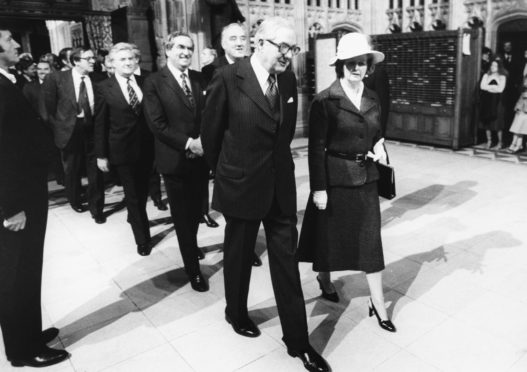Time was when election outcomes depended (or were thought to depend) on competing parties’ claims to economic competence.
Had the party in government made a good or bad job of managing the country’s finances and its public services? What was its record like on jobs and wages? Was the principal opposition party likely to do better or worse?
Questions of that sort dominated political debate. Underpinning them was a belief that voters were unlikely to put in power a party whose policies might have the effect of making them or their families poorer.
Underpinning them too was an assumption that, though the country’s government could be up for grabs, its underlying unity was not in contention.
There is one part of the United Kingdom, admittedly, where these calculations never held true. When appointed Northern Ireland Secretary by Theresa May, Karen Bradley might not have realised that in Ulster, as she put it, ‘people who are nationalists don’t vote for unionist parties and vice versa’. But this, to most folk other than Ms Bradley, was scarcely an earth-shattering discovery.
Ever since the rest of Ireland opted out of the UK almost 100 years ago, the Northern Ireland electorate has mostly consisted of two entirely distinct camps – one favouring union with what’s now the Irish Republic, the other wedded to the maintenance of Northern Ireland’s links with Britain. What Northern Ireland parties say or do about the economy, jobs and matters of that sort are thus secondary to where they stand on Ulster’s constitutional position.
But if what might be called the politics of identity – Irish or British in the Ulster case – were once peculiar to Northern Ireland, they are so no longer. Today voter behaviour in much of the rest of the UK is beginning to be driven less and less by the so-called ‘bread-and-butter’ issues of the past and more and more by concerns that are by no means unlike those that have for ages loomed so large in Ulster.
This has been true for some time now of Scotland – certainly since the independence referendum of 2014. Prior to that vote, there was an expectation (or perhaps a hope) in some quarters that, if independence was rejected, Scottish politics would return to what was often described as ‘normal’ – by which was meant a relegation of constitutional and related questions to the electoral sidelines.
Well, that manifestly hasn’t happened. Scotland didn’t choose independence in 2014. But instead of fading away, the issue of whether Scots should or shouldn’t go down that road is becoming ever more dominant electorally.
Now English politics too are becoming equally shaped by people’s changing sense of who they are and of how their identity ought to be reflected in their country’s governance.
All sorts of influences are bound up in the push for Brexit and for separation from the European Union. But one key factor has been the Brexit project’s success in channeling a strain of English politics so consumed by a need to be free of the EU that all sorts of other once vital considerations – such as the maintenance of the closer-to-home union with Scotland and Northern Ireland – are being widely set aside.
As recent polling has shown, a large majority of Tory voters and Tory party members south of the border would happily settle for a Brexit that brought in its wake both Irish unification and Scottish independence. The nation with which they primarily identify, in other words, is no longer Britain or the UK but England. And their political priorities are being reshaped accordingly.
Nor can it any longer be taken for granted that voters will automatically turn away from policies that all the evidence suggests will leave them less well off than previously. Brexit seems to many voters to be so worth having, polling again suggests, that they refuse to be put off the idea by the virtual certainty that its impact on living standards will be negative.
Much the same is probably true of lots of pro-independence voters in Scotland. Which is why, whether in relation to Brexit or Scottish independence, political campaigning of the old style is increasingly ineffective. The Bill Clinton team motto of 1992 – ‘It’s the economy, stupid’ – made a great deal of sense, in the UK as much as in the US, when economic wellbeing, or the lack of it, trumped all other issues.
But that sort of approach won’t necessarily deliver the electoral goods when, by very many people, the economy’s health is deemed less pressing than a quite different objective – such as making Scotland independent or getting England out of the EU.
Might all of this be just a passing phase? Will the English nationalism unleashed by Brexit simply fade away? Will Scottish nationalists give up on the notion of independence? Will saltires and St George’s crosses be relegated to museums and will the Union jack flutter over a constitutionally contented UK where elections turn on nothing more inflammatory than who’s got the best approach to managing the NHS? Perhaps. But no such outcome – however desirable to some – seems very likely.
Jim Hunter is a historian, award-winning author and Emeritus Professor of History at the University of the Highlands and Islands











